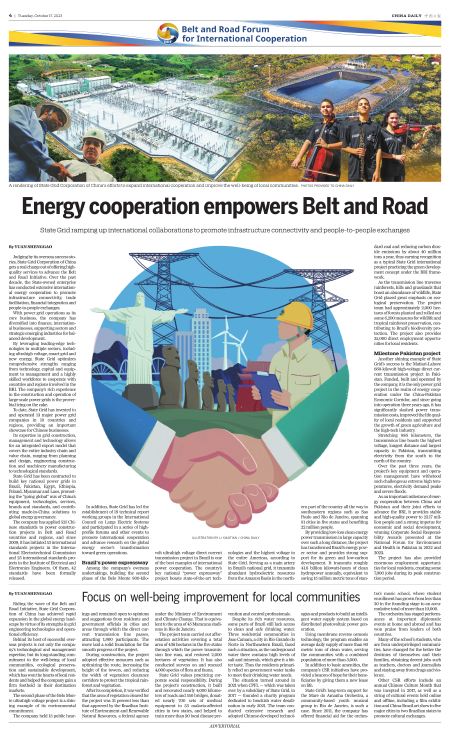Riding the wave of the Belt and Road Initiative, State Grid Corporation of China has achieved rapid expansion in the global energy landscape by virtue of its strengths in grid engineering technologies and operational efficiency.
Behind its host of successful overseas projects is not only the company's technological and management expertise, but its long-standing commitment to the well-being of local communities, ecological preservation and sustainable development, which has won the hearts of local residents and helped the company gain a firm foothold in their destination markets.
The second phase of the Belo Monte ultrahigh voltage project is a shining example of its environmental commitment.
The company held 13 public hearings and remained open to opinions and suggestions from residents and government officials in cities and areas through which the direct current transmission line passes, attracting 1,900 participants. The move laid a solid foundation for the smooth progress of the project.
During construction, the project adopted effective measures such as optimizing the route, increasing the height of the towers, and reducing the width of vegetation clearance corridors to protect the tropical rainforest and vegetation.
After its completion, it was verified that the area of vegetation cleared for the project was 31 percent less than that approved by the Brazilian Institute of Environment and Renewable Natural Resources, a federal agency under the Ministry of Environment and Climate Change. That is equivalent to the area of 45 Maracana stadiums in Rio de Janeiro.
The project team carried out afforestation activities covering a total area of 436 hectares in the five states through which the power transmission line runs, and restored 2,000 hectares of vegetation. It has also conducted surveys on and rescued 4,000 species of flora and fauna.
State Grid values practicing corporate social responsibility. During the project's construction, it built and renovated nearly 4,000 kilometers of roads and 550 bridges, donated nearly 700 sets of medical equipment to 33 malaria-affected cities in two states, and helped to train more than 90 local disease prevention and control professionals.
Despite its rich water resources, some parts of Brazil still lack access to clean and safe drinking water. Three residential communities in Joao Camara, a city in Rio Grande do Norte in Northeastern Brazil, faced such a situation, as the underground water there contains high levels of salt and minerals, which give it a bitter taste. Thus the residents primarily relied on government water tanks to meet their drinking water needs.
The situation turned around in 2021 when CPFL — which was taken over by a subsidiary of State Grid, in 2017 — founded a charity program dedicated to brackish water desalination in early 2021. The team conducted extensive research and adopted Chinese-developed technologies and products to build an intelligent water supply system based on distributed photovoltaic power generation.
Using membrane reverse osmosis technology, the program enables an average daily supply of more than 80 metric tons of clean water, serving the communities with a combined population of more than 3,000.
In addition to basic amenities, the company's CSR initiatives have provided a beacon of hope for their beneficiaries by giving them a new lease on life.
State Grid's long-term support for the Mare do Amanha Orchestra, a community-based youth musical group in Rio de Janeiro, is such a case. Since 2011, the company has offered financial aid for the orchestra's music school, where student enrollment has grown from less than 30 in the founding stage to an accumulative total of more than 10,000.
The orchestra has staged performances at important diplomatic events at home and abroad and has won praise from leaders of both countries.
Many of the school's students, who are from underprivileged communities, have changed for the better the destinies of themselves and their families, obtaining decent jobs such as teachers, doctors and journalists and staying away from drugs and violence.
Other CSR efforts include an annual Chinese Culture Month that was incepted in 2017, as well as a string of cultural events held online and offline, including a film exhibition and China-Brazil art show in five major cities in two Brazilian states to promote cultural exchanges.

